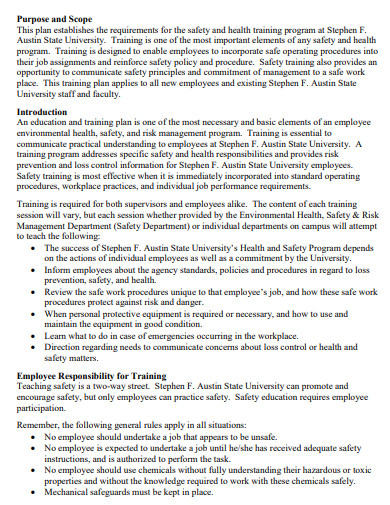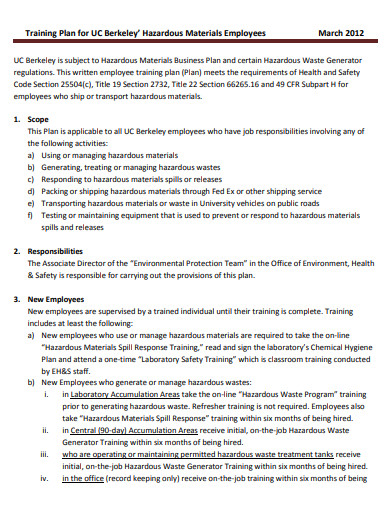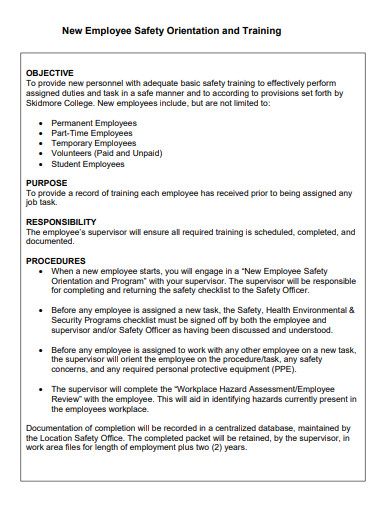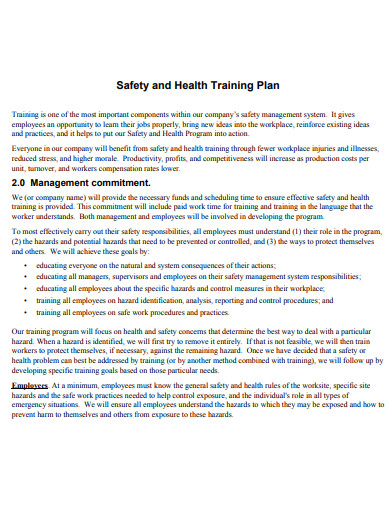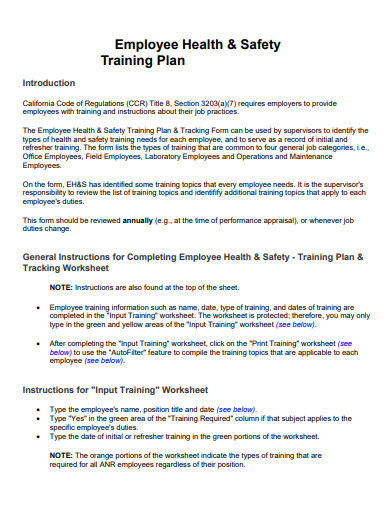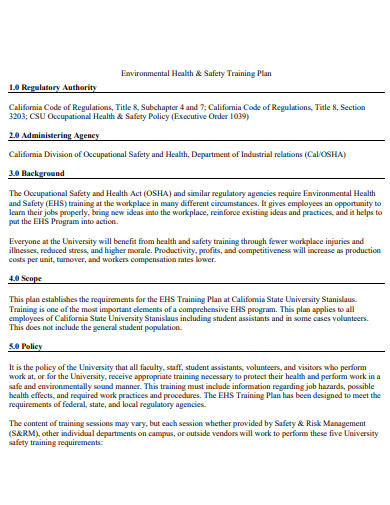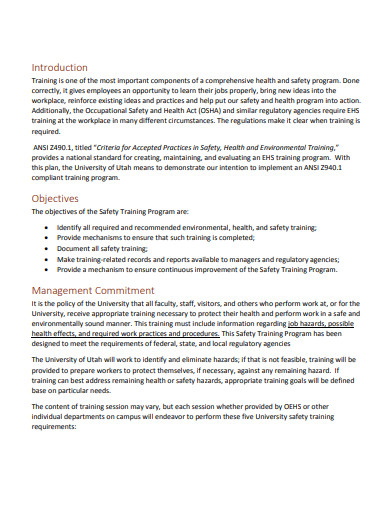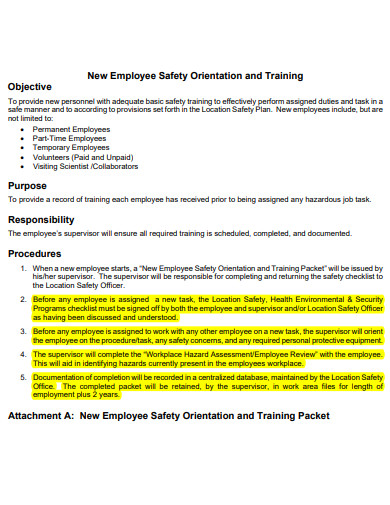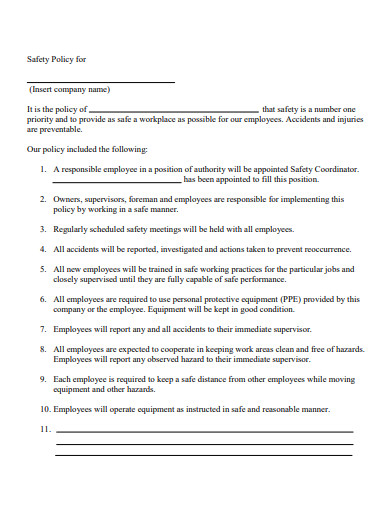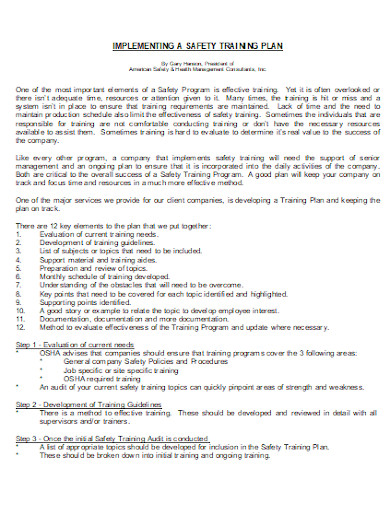Safety training is a process that strives to equip your employees with the knowledge and skills they need to do their jobs safely for themselves and their coworkers. Instructions and standards for identifying hazards, reporting them, and dealing with occurrences are all part of a good safety plan. You must foster a positive incident reporting culture in order to easily establish a safer workplace and uncover ways for your firm to improve the environment. When an incident occurs, you must have a timely way to communicate the message to all of your staff in order to prevent it from happening again. Employees must have easy access to previous danger reports in order to learn on the job.
One of the most significant aspects of our company’s safety management system is training. It allows employees to properly learn their professions, introduce new ideas into the workplace, reinforce existing ideas and practices, and aids in the implementation of our Safety and Health Program. Safety and health training will benefit everyone in our firm by reducing occupational injuries and illnesses, reducing stress, and increasing morale. As manufacturing costs per unit, turnover, and employees compensation rates decrease, productivity, profits, and competitiveness will rise.
10+ Employee Safety Training Plan Samples
1. Employee Safety Training Plan
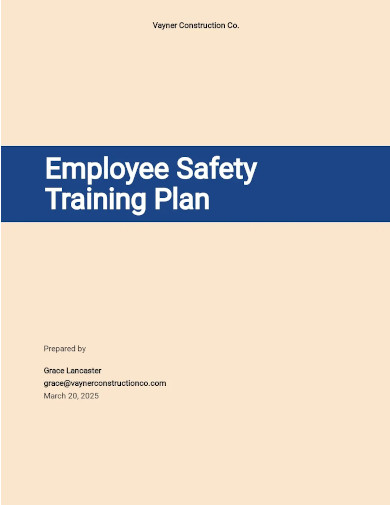
2. Employee Safety and Health Training Plan
3. Employee Hazardous Materials Safety Training Plan
4. New Employee Safety Orientation and Training Plan
5. Sample Employee Safety Training Plan
6. Simple Employee Safety Training Plan
7. Employee Safety Training Plan Example
8. Employee Workplace Safety Training Plan
9. Simple Employee Safety Orientation and Training Plan
10. Formal Employee Safety Training Plan
11. Printable Employee Safety Training Plan
Getting Started
Each of these employee safety training topics is a vital component of your company’s overall commitment to ensuring the safety of your employees and customers. While these safety topics may not cover everything you need to know, they’re a wonderful place to start.
- Workplace ergonomics – Perhaps your staff work in a comfortable office with closed windows and climate control. What’s the worst that might happen? While the chances of injury at the office are less compared to those on an oil rig or a construction site, ergonomic workplace injuries can cost your firm a lot of money in worker’s compensation claims and lost productivity.
- Fire safety – We assume that our adult employees are familiar with fire safety, but it is a crucial (and OSHA-mandated) component of every industry. Employee egress in the case of a fire must be covered in new employee safety training. Many employers do not want their staff battling flames, but they do know how to keep themselves safe and report an occurrence. Employees in some industries may also be trained in the usage of fire extinguishers.
- Workplace violence prevention – Employee safety training should include measures for preventing workplace violence, such as recognizing the risk factors and symptoms of the potential workplace and domestic violence. This might literally save the life of one of your employees.
- Employee health resources – Employee resources used to be limited to a few mental health and substance addiction booklets in the HR department, along with possibly some brief health training. Employers are increasingly understanding the need of assisting employees with all of their issues, both on and off the job. If your company has a great mental health support policy, let them know about it. If you include these perks in your recruitment campaign, your employees will see you as a firm that cares. Employees that feel valued are more likely to work more, stay longer, and contribute more to your company’s success.
- Environmental safety – The more hazardous products your organization handles, the more important environmental safety training becomes. Environmental safety training is beneficial to all businesses, but dealing with biohazards and hazardous waste requires more than a passing mention. This should be a substantial and well-rounded component of your training program.
- Equipment safety – This is a factor that is heavily influenced by the industry you work in. Make a list of all the machinery and equipment that your staff will come into touch with. Cover any personal protective equipment they’ll need when working in hazardous environments or with specialized equipment in detail.
- Online safety and cyber security – Today, so much of our work takes place online. While cybersecurity isn’t normally covered in health and safety issues, it’s an important part of your training programs. By ensuring that all employees are following best practices when it comes to being online, online safety training protects your employees, your customers, and your company. This includes things like standardized passwords and two-step verification procedures, as well as adhering to any HIPAA rules for securing sensitive health information.
FAQs
Why is it important to understand the needs of the employees?
Your safety training must take into account the people who will be receiving it. Too broad and general information might be ineffectual and time-consuming. Make your training specific to the demands of your firm and the existing knowledge of your staff.
Why do you need safety training in your business?
Aside from the obvious reasons for investing more time and attention in a well-planned workplace safety training program – regulation and moral obligation – there are numerous other benefits to doing so. Here are a few examples:
– Insurance rates are lower.
– Less productivity loss as a result of illness or injury
– Increased employee satisfaction
– Workers’ compensation for medical leave due to work-related diseases and injuries has been reduced.
– Liability lawsuit protection
– Incident prevention in the future
If you want to see more samples and formats, check out some employee training safety training plan samples and templates provided in the article for your reference.
Related Posts
FREE 4+ Contractor Safety Management Plan Samples in PDF DOC
FREE 10+ Construction Health And Safety Plan Samples [ Phase ...
FREE 10+ Staff Training Program Samples [ Orientation ...
FREE 10+ Training Project Proposal Samples in MS Word Google ...
FREE 3+ Management Training Proposal Samples in PDF MS ...
FREE 10+ Project Safety Plan Samples [ Construction, Health ...
FREE 10+ New Employee Orientation Checklist Samples [ Safety ...
FREE 10+ Contractor Safety Plan Samples [ Painting, Electrical, Site ]
FREE 10+ Employee Training Plan Samples in MS Word Pages ...
FREE 8+ Safety Program Samples in PDF
FREE 10+ Workplace Safety Checklist Samples [ Inspection, Health ...
FREE 10+ Contractor Safety Program Samples [ Site, Health ...
FREE 10+ Project Safety Management Plan Samples in PDF DOC
FREE 7+ Sample Safety Manual Templates in MS Word PDF
FREE 10+ Construction Safety Management Plan Samples [ Road ...

